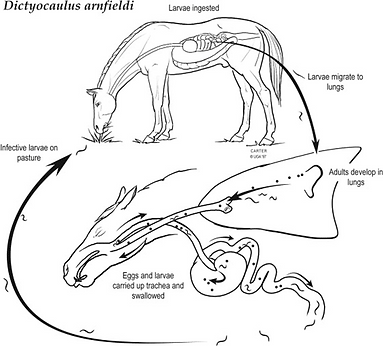Lungworm
-
Dictyocaulus arnfieldi
-
Infection of the lower respiratory tract
-
Donkeys are the natural host of the parasite
-
Horses typically only infected if they graze with donkeys
-
Believed to cause coughing, but this is not always the case
-
Cases in adult horses are generally asymptomatic as worms do not reach maturity. However, it is possible for worms to develop to adulthood in youngstock causing respiratory disease.
Parasite lifecycle
The lungworm eggs are excreted in the dung, the larvae hatch out on the pasture and develop though their growth stages to stage 3 where they become infective. They are ingested with grass where they migrate to the small intestine, from here the larvae continue to develop and migrate to the lungs. The mature females lay their eggs in the bronchioles. The eggs are then coughed up, swallowed and excreted for the cycle to start again.
What do they look like?
White threadlike worms; males approximately 3.5cm and females approximately 6.5cm
What damage do they cause?
-
Increase in mucus and inflammation of the bronchi (air sacs) in the lungs
Clinical Signs
-
Clinical signs are rare. Can cause a moderate to chronic cough according to the level of infection
Diagnosis and Detection
-
Difficult to diagnose
-
ScientifEQ offers the Baermann faecal flotation test to detect the presence of eggs in a dung sample
-
Your vet can further diagnose lungworm infections using endoscopy to examine the respiratory tract and performing washes of the lower airway to detect eggs, larvae and worms.
Treatment
-
Sensitive to most kinds of wormers especially moxidectin, ivermectin and benzimidazole which kill both the migrating larvae and adult worms
Preventative Measures
-
Good pasture management
-
Take particular care when horses and donkeys are grazing together
Current Issues in 2015
-
This parasite is not currently considered a widespread threat in the UK




